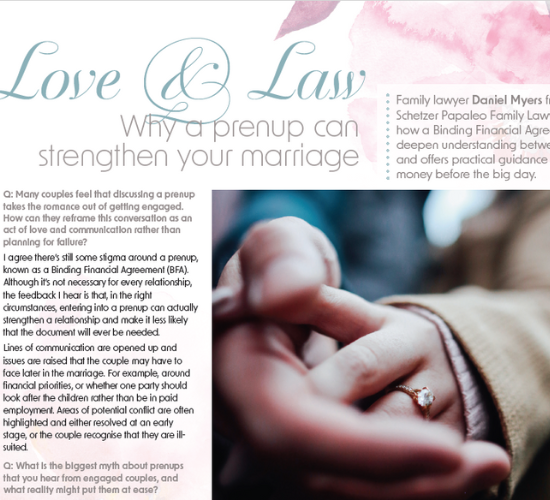Are we de facto or “friends with benefits”? How long do I need to prove I was in a relationship? How do I protect my assets from a de facto relationship or new partner?
Lawyer, Stella Kahn-Allen answers these often asked questions regarding de facto relationships and more.
In 2009, the Family Law Act 1975 (the Act) gave power to the Federal Circuit and Family Court of Australia (the Court) to make property settlements and maintenance orders for de facto couples across Australia, except for Western Australia.
Am I in a de facto relationship?
A de facto relationship exists when two individuals (regardless of gender) are not legally married or related by family but have lived together as a “couple on a genuine domestic basis.”
In the event of a relationship breakdown, the property of the de facto partners is treated the same as that of married couples.
The Act sets out factors considered by the Court when determining whether a de facto relationship exists, including:
- the duration of the relationship;
- the nature and extent of their common residence;
- whether a sexual relationship existed;
- degrees of financial dependence or interdependence and any arrangement for financial support between the parties;
- ownership, use and acquisition of any property;
- degree of mutual commitment to a shared life;
- whether the relationship is or was registered under a prescribed law of a State or Territory as a prescribed kind of relationship;
- care and support of any children; and
- reputation and public aspects of the relationship.
No one specific factor is required to determine whether a de facto relationship exists. The Court considers the overall circumstances necessary to establish whether there is a de facto relationship (the threshold requirements).
When can either party make a claim under the Family Law Act?
Once it has been established that a couple are, or have been, in a de facto relationship, either party will be able to make a claim under the Family Law Act for property settlement or maintenance in one or more of the following circumstances:
- If they’ve been in a de facto relationship for two years or more; or
- They have a child together; or
- They’ve registered their domestic relationship at a state level; or
- If the party applying for an order made “substantial” contributions to the relationship.
De facto or “friends with benefits”?
In the case of Regan & Walsh the parties acknowledged that they had known each other since 2005 and had shared a residence at various times for total of 6 years. However, one party claimed that the relationship was genuine, while the other viewed it as merely a “friends with benefits” situation.
The Court determined the parties were not a couple living together on a genuine domestic basis and therefore no de facto relationship existed. Reasons:
- there was an ‘absence of’ joint ownership or property acquisition;
- a lack of mutual commitment to a shared life; and
- no outward perception of a de facto relationship (i.e. they were not considered a couple to friends and family).
Therefore, in this instance, the Family Law Act did not apply. As a result, a person found not to be in a de facto relationship will not be entitled to a division of property or maintenance and will need to rely on state common law for any property-related orders.
How long do I have to make a claim?
Parties have up to 2 years from the date of separation to make a claim for property settlement or maintenance. However, an application can be made out of time if the Court is persuaded that denying the application would cause hardship to a child or the party involved. Additionally, orders can be sought by consent even if made out of time. For more details, please refer to our article, “Issuing Proceedings Out of Time.”
How do I protect my assets from a de facto relationship or new partner?
You and your partner might choose not to combine finances, share a bank account, or jointly own property. It is advisable to maintain separate incomes, debts, and liabilities, although this can be challenging in practice and may ultimately be insufficient to defeat any claim brought.
A Binding Financial Agreement (also known as a ‘BFA’ or ‘pre-nup’) is often the most effective method for protection against a future property settlement. A BFA outlines how assets will be kept or divided if the relationship ends, including assets owned at the start and assets accrued during the relationship.
If you are unsure whether you are in a de facto relationship, what your rights may be, or need assistance with a BFA, please contact us.



